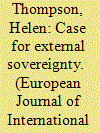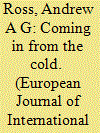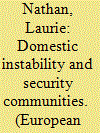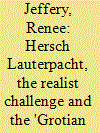|
|
|
Sort Order |
|
|
|
Items / Page
|
|
|
|
|
|
|
| Srl | Item |
| 1 |
ID:
071780


|
|
|
|
|
| Publication |
2006.
|
| Summary/Abstract |
Critics of sovereignty have argued that it produces outcomes that violate universal moral principles. This article offers a qualified defence of external sovereignty by returning to some of the arguments first deployed to support claims to it. The article argues that if claims to external sovereignty are understood in part as a critique of the ambitions of powerful states, then the presumption of it in international politics, not as an absolute value but a crucial consequential consideration, could act as a restraint on the power of the world's strongest states by making justifications for war somewhat more difficult.
|
|
|
|
|
|
|
|
|
|
|
|
|
|
|
|
| 2 |
ID:
071776


|
|
|
|
|
| Publication |
2006.
|
| Summary/Abstract |
A variety of constructivists have begun to address emotions in IR, viewing emotional events and memories as important dimensions to the social construction of identity. But it is not clear that constructivist tools, designed in most cases for interpreting discursive representations, are equipped to study affective phenomena. This article offers a critical assessment of constructivism's ability to theorize affects-nonconscious and embodied emotional states-in global politics. Using as an example the ontology developed by Alexander Wendt, the article suggests that common presuppositions in orthodox constructivism in fact obstruct the study of affect and its role in social and political life. To grasp the depth, intensity, and fugitivity of emotional phenomena, constructivism needs to rethink its attachments to reflective agency, ideational processes, and symbolic meaning. Through a brief discussion of the American response to 9/11, the final section develops several propositions on the role of affect in forging political identities.
|
|
|
|
|
|
|
|
|
|
|
|
|
|
|
|
| 3 |
ID:
071782


|
|
|
|
|
| Publication |
2006.
|
| Summary/Abstract |
The problem of political instability is neglected in the literature on security communities. In this article I argue that domestic stability, defined as the absence of large-scale violence in a country, is a necessary condition of these communities. Domestic violence precludes the existence of security communities because it renders people and states insecure; it creates the risk of cross-border destabilization and violence; and it generates uncertainty and tension among states, inhibiting trust and a sense of collective identity. I conclude that the benchmark of a security community-dependable expectations of peaceful change-should apply as much within states as between them. This is consistent with the work of Karl Deutsch, whose pioneering concept of a security community is widely understood to mean the absence of interstate war. Deutsch, in fact, was equally concerned with large-scale internal violence.
|
|
|
|
|
|
|
|
|
|
|
|
|
|
|
|
| 4 |
ID:
071777


|
|
|
|
|
| Publication |
2006.
|
| Summary/Abstract |
This article argues that although he is ordinarily relegated to the realm of international legal scholarship, Hersch Lauterpacht made a significant contribution to the development of International Relations theory. In particular, it demonstrates that in attempting to address the range of debates surrounding the relationship between law and morality in the interwar and postwar eras, Lauterpacht not only engaged directly with E.H. Carr's criticisms of 'utopian' thought but was responsible for providing the most comprehensive expression of the 'Grotian tradition' to date, a tradition that later appeared in the works of Martin Wight and subsequent scholars. In doing so, this article seeks to achieve not only Lauterpacht's reincorporation into the history of International Relations scholarship but brings into question the disciplinary demarcations that divide the so-called 'disciplines' of International Relations and International Law.
|
|
|
|
|
|
|
|
|
|
|
|
|
|
|
|
| 5 |
ID:
071774


|
|
|
|
|
| Publication |
2006.
|
| Summary/Abstract |
How is unrivalled American power reshaping 21st-century international society? Is the United States an empire, in fact or in the making? This article attempts to elaborate the conceptual resources required to answer such questions. I focus on multiple forms of hierarchy in anarchy and diverse practices of sovereign inequality-concepts that most mainstream perspectives ignore, find paradoxical, or even dismiss as self-contradictory. After defining empire and hierarchy in anarchy, I present a typology of international orders tuned to thinking about empire and its alternatives. The central section of the article explores three classes of formal inequalities common during the Westphalian era-special rights of Great Powers, restricted rights for outlaws, and a wide range of particular practices of 'semi-sovereignty'. I then sketch ten historically grounded models of hierarchical international relations. Two brief applications to contemporary American power seek to illustrate the value of this conceptual apparatus. Throughout, my focus is on appreciating the precise nature and considerable variety of international inequalities. I argue that the concepts of hierarchy in anarchy and sovereign inequality, but not empire, are essential for understanding the shape and development of contemporary international order.
|
|
|
|
|
|
|
|
|
|
|
|
|
|
|
|
| 6 |
ID:
071775


|
|
|
|
|
| Publication |
2006.
|
| Summary/Abstract |
This article employs a cross-level approach to explain cooperation in transatlantic competition policy. The explanation reveals the important role of regulators as interfaces between the domestic and international levels of analysis. Economic internationalization is a system-level cause of this cooperation, the precise effect of which is accounted for by an intervening variable (domestic politics), which is simplified with a principal-agent model. The negotiations over the 1991 EU-US Bilateral Competition Agreement suggest that, while regulators remain constrained by domestic institutions, they play an important role in explaining why the formal, transatlantic cooperative framework is largely a discretionary one created by a non-treaty international agreement.
|
|
|
|
|
|
|
|
|
|
|
|
|
|
|
|
|
|
|
|
|